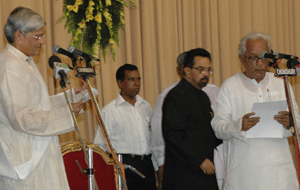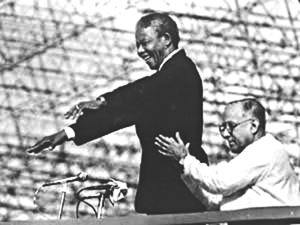 People's Democracy
People's Democracy
(Weekly
Organ of the Communist Party of India (Marxist)
No. 26
June 25, 2006
(Weekly
Organ of the Communist Party of India (Marxist)
|
Vol.
XXX
No. 26 June 25, 2006 |
The Significance Of The Seventh LF Govt

Buddhadeb Bhattacharjee being sworn in as chief minister on May 18, 2006
Biman Basu
THE sweeping electoral triumph of the Bengal Left Front under the leadership of the Communist Party of India (Marxist) was replete with significance. For the seventh consecutive time a Communist-led Left Front government could be established in a country within the confines of a federal polity in a bourgeois-landlord State led by the big bourgeoisie. This in itself is perhaps unprecedented in the political annals of the world. Certainly, the triumphant existence in continuum of the Communist-led Left Front government in Bengal has created a new chapter in the history of the country itself.
In the recent past, a series of coalition governments have sprung up at the level of the states and the centre. Many of these governments, particularly those of ruling parties, for all purposes are the product of an electoral coalition of opportunism, and are anti-people.
Not being motivated by a declared principle of serving the people in general, these governments frequently suffer from shifting partners, giving birth to newer sets of coalitions, equally opportunistic as the predecessors they would replace.
These coalition outfits have no interest in the fundamental task of land reforms. They do not care for the interest of the rural poor, the small and marginal farmers, and for the kisans in general. The states under the governance of these coalition regimes do not get to build up the rural economic base. The economic development itself suffers grievously in the circumstances and the onus of the crisis is shifted onto the shoulders of the common man, especially the poor and the downtrodden.

Jyoti basu with Yasser Arafat during their visits to Kolkata
LEFT FRONT: THE UNIQUENESS
The Left Front is not a coalition of convenience. It is not a mere electoral alliance. It has come up through the rigours of struggle. It is deeply set in the hearts and minds of the people, especially of the toiling masses. The Left Front government is thus a government with a difference.
A few instances of the pro-people outlook of the Bengal Left Front government may be cited here. In 1977, the first Left Front government was swept to office riding the wave of a popular wave. In 1978, the new government has put in a comprehensive programme of redistributive land reforms where big ceiling surplus land chunks were redistributed amongst the rural poor. Concurrently organised, the Operation Barga aimed at securing the rights of the bargadars or sharecroppers. In the same year, elections to the rural panchayats were held and these three-tier institutions have functioned since as the rural government.
Irrigated land parcels grew rapidly. Before 25 years have gone, the state of Bengal had become surplus in food production. The economic base of the state was built up solidly and the base was located in the realm of land reforms and agricultural growth.
In 1994 was announced the state industrial policy under the stewardship of the then chief minister Jyoti Basu. Infrastructure started to be built up rapidly. Infrastructure, including communications, roadways etc started to improve in a coordinated manner. From the mid-1980s the two large-scale industrial units, the Haldia Petro-Chem and the Bakreswar Thermal Power plant had started to function boosting the economic growth of the state. The struggle that preceded the setting up of the industrial infrastructure was soon turned into a massive people’s struggle with all sections of the people participating in it even as the then union government delayed the clearance, in both instances, by at least a decade, a clearance that was mandatory.
PATH OF DEVELOPMENT
As the fifth Left Front government advanced along the path of development, a cluster of investors, indigenous and foreign, started to regard Bengal as an investor-friendly state and commenced investing in technology-driven industries. Industries can be set on identified land parcels: availability of land thus is a precondition to industrial take off. Such dedicated land parcels come from fallow and uncultivable land although in a few instances, cultivable land preferably of the single-crop variety, too, must be utilised.
Those who stand against developmental programmes in Bengal and those who militate against the setting up of new industrial units cry foul and splutter out that an agricultural crisis would follow. This is a calumnious lie campaign aimed at creating uncertainty among the people. Facts speak for themselves. For example, the total agricultural land in 1991 stood at 1.25 crore hectare. Despite some amount of land being taken over for industrial purposes, the total agricultural land in 2001 increased to stand at 1.37 crore hectare. Thus, when we speak about building up our industries based on the success of our agricultural growth, the people of Bengal support us in a big way.
An important feature of the Bengal Left Front governance is that during this period, a strong movement could be built up with the participation of a vast number of people to struggle against and isolate every form of fundamentalism and separatism. Massive rallies of people at the Brigade Parade Grounds were held by the Left Front for the purpose of safeguarding and securing national integrity and unity, and communal harmony. The Left Front was supported in this bid by other Left parties.
It is essential to establish and gain all-round success in the realm of education. Under the auspices of the pro-people Left Front government, education has spread wide amongst the masses, and the poorer sections of the society are no longer deprived of the light of education in any manner. Technical education has flourished. More and more students have entered the portals of higher education. The struggle to maintain quality at all tiers of education has continued apace. The number of universities has increased. The outlook of the Left Front government in the spread of education is to develop human resources in a coordinated manner. The viewpoint of the Left Front government is to serve the interests of the common man.
The Left Front government in delineating its plans and programmes has always kept a special place for the poor and the downtrodden. Constant review of work is done and rigorously. The Left Front government is uncompromisingly dedicated to the task of eradicating social crime and social wrongs, building up a strong public opinion on this issue.

Jyoti basu with Nelson Mandela during their visits to Kolkata
STRUGGLE AND DEVELOPMENT
The ongoing unstinted efforts on the part of the Left Front government to struggle against limitation of financial powers and to chalk out an alternate path of development have attracted the attention of the people and have impressed them. The Left Front government has taken a pledge to honour this recognition and to further accelerate the struggle towards development in the state.
The Bengal Left Front government is making its best efforts in the task of taking the state forward. It does not hesitate to explain in details before the people the reasons why some tasks could not be fulfilled. The people, taken into confidence by the Left Front government, have ensured its continuation in office for the seventh time in succession.
We must not forget even for a moment that it is simply not possible to resolve the basic problems of the people living in a state within the capitalist state structure of our country. Nor is it possible to build up a Socialistic pattern of society in any one particular state in these circumstances. Thus, the Bengal Left Front government is not in a position to implement programmes aimed at setting up Socialism.
In the circumstances, the Party has to keep alive the ideological struggle, enhance the level of consciousness of Party members and close sympathisers, and make clear what we can and what we cannot do in the present state structure. We have to take ever greater care of the poor and the downtrodden. To accomplish this, a multi-faceted struggle is necessary against deprivation, persecution, and corruption. If we are successful in this struggle, we shall be in a position to build up the unity of the toiling masses in the greater struggle for the fulfilment of the long-term tasks that lie ahead.
INCREASED RESPONSIBILITY
In organising and leading the seventh Left Front government, which has started its journey anew from May 18, 2006, the Party has to walk along an untravelled path, implementing the basic teachings of Marxism-Leninism in the concrete situation of the country, its State structure, and the development of the people.
The fact that the Bengal Left Front after running the state government for nearly three decades could win the electoral support of 50.18 per cent people and gain three-fourths of the assembly seats, has naturally increased the expectations of the populace from the LF government. The responsibility of the Party and of all the constituents of the Left Front has concomitantly increased.
Those of the toiling masses who have not supported the Left Front (nearly 50 per cent of the electorate) should be approached, our point of view communicated to them, and we have to build a living relationship with them. To win the hearts and minds of the people we need also to freely admit our mistakes and take corrective action as appropriate.
The Bengal Left Front government is undoubtedly an improved, highly developed pro-people government functioning taking into account the concrete realties of the country. If it were thought that this government is able to tackle and resolve the basic problems of the people, there would be the danger of a right deviation. Similarly, there would be cause for left adventurism to develop if it is presumed that this kind of government is never in a position to implement pro-people programmes.
We must take steps to strengthen the Left-democratic forces by leading the Left Front government, within the evolving concrete realities, towards pro-people governance, towards extension of the democratic movement, and towards holding up the honour and prestige of the Communists and the Left in the political history of the country. The task of political education must proceed apace. In working for the interests of the people, the Party leadership and Party workers must be enlightened with the realisation of the situation that unfolds before us.
TASKS BEFORE THE PARTY AND THE LF
To put in place the programme for the accelerated pace of industrialisation of Bengal, the Party and Left Front workers must think in similar terms and go boldly forward and engage themselves towards a successful implementation of the assigned tasks. While we may not be able to fulfil every hope and aspiration of the people, we must as Marxist-Leninists take advantage of the evolving reality and prove ourselves equal to the task. Communists do not repose trust in fate. Thus, each of us shall have to continue to engage himself/herself in carrying forth our responsibility with alacrity to expand further the twin processes of development and struggle in Bengal. The struggle is never ending.
Without the development of human resources, it is not possible, despite growth indicators elsewhere, to build up the soldiers and architects of struggle. The Bengal Left Front government can shine as a leading light before the toiling masses of the country, before the democratic, progressive, and secular people. And for this the Party committees must engage themselves in the political-organisational tasks, grasping the reality and taking part in the twin processes of struggle and development.